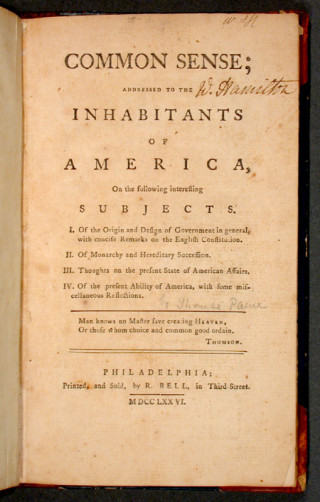To this day, Paine is mostly remembered for his fiery rebellious writings during revolutionary times, here in America and later on during similar periods of political upheaval in England and France. A rebel with a cause.
But to the author, independence was only part of the picture. The real question he posed in Common Sense was, he said, what happens next? A fear of the unknown, Paine believed, was tugging against any steps toward independence.
So, Common Sense offered what Paine called some “hints” to address that fear. It outlined a plan. And among the proposals were several that smack of originality. Having spent the first part of Common Sense offering a scathing criticism of the British monarchy, nobility and hereditary rule, Paine advanced a different idea, one built entirely around republican principles.
The pamphlet offered the following brief but packed recipe for American governance: “Let the assemblies be annual, with a President only. The representation more equal. Their business wholly domestic, and subject to the authority of a Continental Congress.” Gone was the monarchy, any hint of hereditary privilege and the separation of powers and checks and balances. The latter omission disturbed Adams: Paine’s proposals, he said, were far too “democratical.”
Paine recommended that a “Continental Conference” be called for purposes of framing a “Continental Charter, or Charter of the United Colonies . . . fixing the number and manner of choosing members of Congress, members of the Assembly, with their date of sitting, and drawing the line of business and jurisdiction between them. (Always remembering, that our strength is continental.)” This charter should secure
freedom and property to all men and, above all things, the free exercise of religion, according to the dictates of conscience … Yet that we may not appear to be defective even in earthly honors, let a day be solemnly set apart for proclaiming the charter; let it be brought forth placed on the divine law, the word of God; let a crown be placed thereon, by which the world may know, that so far as we approve of monarchy, that in America THE LAW IS KING.
At least one future scholar found in Paine’s “hints” some fundamental principles of a nascent American constitutionalism. Political scientist Edward S. Corwin wrote the following about Paine’s scheme in Common Sense: “In this singular mixture of sense and fantasy, so characteristic of its author, are adumbrated a national constitutional convention, the dual plan of our federal system, a national bill of rights, and ‘worship of the Constitution.’”
